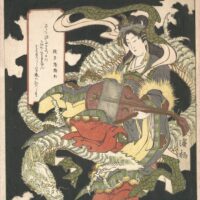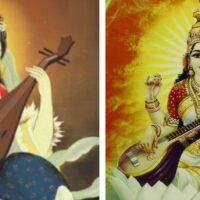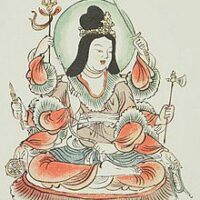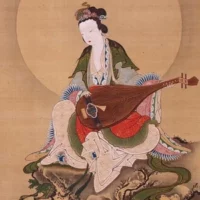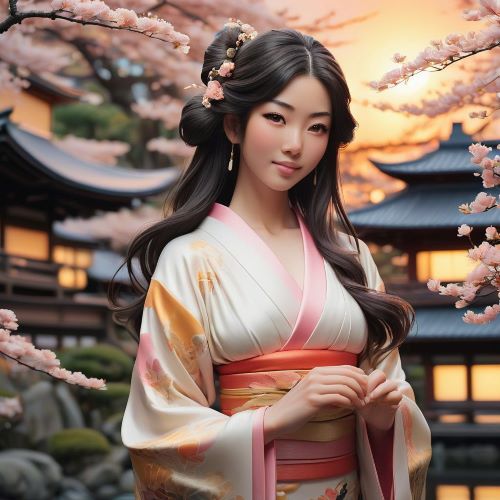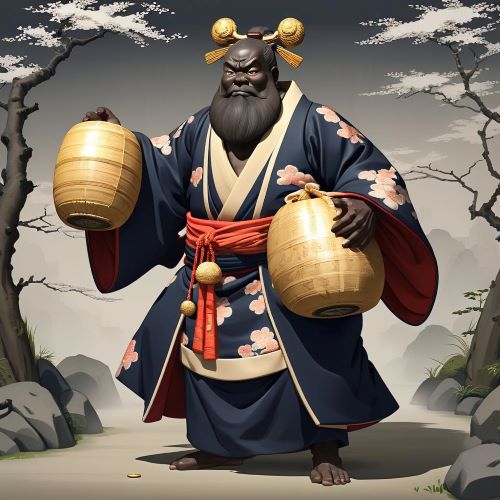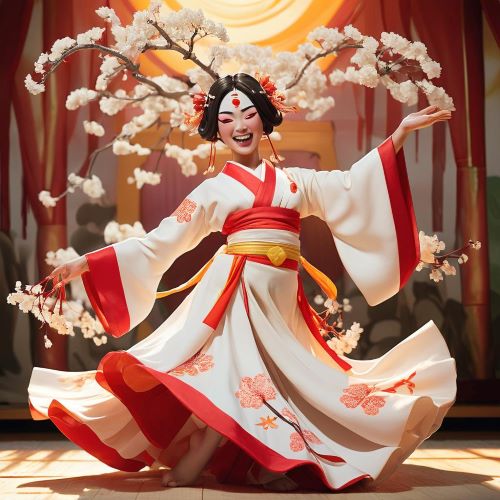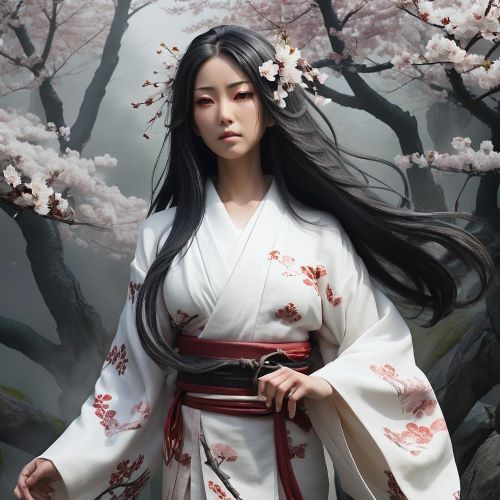Benzaiten : The Flowing Goddess
Listen
At a glance
| Description | |
|---|---|
| Origin | Japanese Mythology |
| Classification | Gods |
| Family Members | Daikokuten (Husband) |
| Region | Japan |
| Associated With | Water, Music, Flow, Wisdom, Wealth, Saraswati |
Benzaiten
Introduction
Benzaiten, also known as Benten, is a prominent figure in Japanese mythology, revered as the goddess of everything that flows: water, music, eloquence, and knowledge. Her origins trace back to the Hindu goddess Saraswati, who embodies wisdom, arts, and learning in Indian culture. As Buddhism spread from India through China to Japan, Benzaiten’s image and attributes evolved, integrating various cultural elements along the way. In Japan, she is counted among the Seven Lucky Gods (Shichifukujin), celebrated for bringing good fortune and happiness. Over time, Benzaiten has become a syncretic deity, blending aspects of Buddhism, Shinto, and local Japanese beliefs, making her a unique symbol of cultural amalgamation.
Physical Traits
Benzaiten is often depicted as a beautiful woman, exuding grace and wisdom, and frequently shown with long flowing hair, symbolizing her connection to flowing water and music. She is commonly portrayed carrying a biwa, a traditional Japanese lute, highlighting her patronage of music and the arts. Her iconography varies: she is sometimes accompanied by a serpent or dragon, creatures associated with water and the divine, or shown with multiple arms, each holding different objects like a bow, arrow, wheel, and sword, reflecting her multifaceted nature and extensive powers. Often, she appears adorned in traditional Heian period clothing or flowing robes, resembling a celestial being with Buddhist halos, or as a graceful courtesan, emphasizing her association with love and the arts.
Family
Benzaiten’s origins are multifaceted, rooted in the Hindu goddess Saraswati, the patron of knowledge, music, and the arts. As Buddhism spread eastward, Saraswati’s influence reached Japan, where she evolved into the beloved Benzaiten. In Japanese mythology, Benzaiten does not have a traditional family structure, but she is associated with the Seven Lucky Gods (Shichi-fuku-jin), a group representing various aspects of fortune and prosperity, where she is the sole female member. Her association with water connects her to the dragon king Ryujin, the ruler of the sea, and she is often depicted with serpentine or dragon-like companions, symbolizing her dominion over water and protective nature. Additionally, some traditions link her with Daikokuten, another member of the Seven Lucky Gods, as her consort.
Other names
Benzaiten is known by several names, each reflecting different aspects of her multifaceted nature and the reverence she commands. Some of these names include Benzaitennyo, Daibenzaiten, Benten, Myōonten, Bionten, Sarasabakutei, Sarasabattei, and Sarasantei. Each name echoes her diverse attributes as a goddess of wisdom, art, and flow. “Benten” is a common alternative name, representing a shortened and colloquial form of Benzaiten. In her Hindu origin as Saraswati, she is known as Sarasvati, symbolizing the flow of wisdom and knowledge. In Buddhist contexts, she is referred to as Myoonten, emphasizing her connection to music and eloquence. These names underscore Benzaiten’s syncretic nature, blending elements from Hinduism, Buddhism, and Shintoism. The name “Benzaiten” itself holds significance, translating to “goddess of eloquence” or “heaven,” reflecting her association with wisdom, communication, and the divine realm.
Powers and Abilities
Benzaiten’s powers and abilities are vast and multifaceted, reflecting her complex nature as a goddess. As the deity of everything that flows, her primary domain is water. She is believed to control the flow of rivers, lakes, and oceans, ensuring their purity and abundance, and protecting against natural disasters like floods and droughts. In addition to her dominion over water, Benzaiten is revered as the goddess of music, arts, and eloquence, symbolized by her association with the biwa lute. Musicians, artists, and writers often seek her blessings for creativity and skill in their crafts. Her eloquence extends to her role as a guide for scholars and students in their pursuit of knowledge and wisdom. Benzaiten is also a goddess of fortune and prosperity, invoked for blessings of wealth and success, with her protective nature symbolized by the white serpent or dragon that often accompanies her. As the goddess of all that flows, Benzaiten’s influence spans water, music, arts, love, wisdom, wealth, and fortune, bestowing eloquence, knowledge, prosperity, and protection upon her devotees.
Modern Day Influence
In contemporary Japan, Benzaiten’s influence remains significant, manifesting in both religious practices and cultural expressions. Numerous temples and shrines across the country venerate her, including renowned sites like the Enoshima Shrine in Kanagawa, Itsukushima Shrine on Miyajima Island, and the Bentendo Hall in Ueno Park, Tokyo. These locations attract a multitude of visitors seeking blessings and paying homage to Benzaiten. Her association with water and music permeates modern Japanese culture, particularly evident in festivals celebrating her, such as the Enoshima Tenno-sai Festival, which features rituals and performances honoring her. Benzaiten’s image also appears in literature, films, and anime, where she symbolizes beauty, wisdom, and artistic inspiration.
In the realm of arts and music, Benzaiten continues to inspire contemporary creators, serving as a muse for many with her symbolic connection to creativity and eloquence. Educational institutions recognize her as a patron of learning, incorporating her image in ceremonies and symbols to invoke blessings for academic success. Furthermore, Benzaiten’s role as a protector and bestower of good fortune resonates with modern spiritual practices, attracting diverse followers seeking personal and professional growth.
Her syncretic nature, blending elements from Hinduism, Buddhism, and Shintoism, contributes to her broad appeal, making her accessible and relatable to a wide audience. Benzaiten’s influence extends beyond Japan, with her message of flowing wisdom, creativity, and love resonating globally as a reminder of life’s interconnectedness and the importance of embracing change.
In modern Japan, Benzaiten remains a popular figure in popular culture, appearing in various forms of media, adorning amulets and charms, and inspiring pilgrimages to shrines near water sources. As one of the Seven Lucky Gods, she continues to hold sway in the arts, inspiring musicians and artists alike. Benzaiten’s enduring significance in contemporary spiritual and cultural life reflects her timeless impact on Japanese society and beyond.
Related Images
Frequently Asked Questions
What is lorem Ipsum?
I am text block. Click edit button to change this text. Lorem ipsum dolor sit amet, consectetur adipiscing elit. Ut elit tellus, luctus nec ullamcorper mattis, pulvinar dapibus leo.
What is lorem Ipsum?
I am text block. Click edit button to change this text. Lorem ipsum dolor sit amet, consectetur adipiscing elit. Ut elit tellus, luctus nec ullamcorper mattis, pulvinar dapibus leo.
What is lorem Ipsum?
I am text block. Click edit button to change this text. Lorem ipsum dolor sit amet, consectetur adipiscing elit. Ut elit tellus, luctus nec ullamcorper mattis, pulvinar dapibus leo.
What is lorem Ipsum?
I am text block. Click edit button to change this text. Lorem ipsum dolor sit amet, consectetur adipiscing elit. Ut elit tellus, luctus nec ullamcorper mattis, pulvinar dapibus leo.
What is lorem Ipsum?
I am text block. Click edit button to change this text. Lorem ipsum dolor sit amet, consectetur adipiscing elit. Ut elit tellus, luctus nec ullamcorper mattis, pulvinar dapibus leo.


